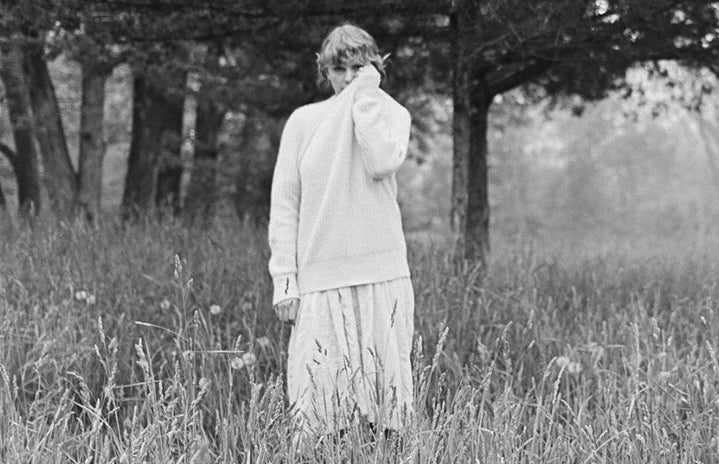If we’ve learned anything about Taylor Swift over the years it’s that she loves putting easter eggs for her fans to catch in her music videos. When it comes to her newest album “Folklore,” Swift goes above and beyond by putting easter eggs in the song lyrics as well. While many listeners may see this album as a 180 from her typical pop songs, Folklore holds much more depth than one can even catch on the first listen. Lucky for you, we’re here to break down the biggest hidden meanings in Folklore written by the mastermind herself.
‘cardigan’/ ‘betty’/ ‘august’ Love Triangle
This trio of songs is what Swift herself refers to as “The Teenage Love Triangle.” On her verified Vevo YouTube channel she comments, “These 3 songs explore a love triangle from all 3 people’s perspectives at different times in their lives.” The three songs mentioned follow the storyline of fictional characters Betty, James and an unnamed mystery woman. In short, the plot describes the relationship timeline of Betty and James who were once together, then broken apart by James cheating on Betty with the unnamed girl and later brought back together after a heartfelt apology. This definitely gets confusing in the mix of the storyline so we’ve written out a quick key to refer back to.
Betty’s perspective: ‘cardigan’
James’ perspective: ‘betty’
Unnamed girl’s perspective: ‘august”
The section of the love story where Betty and James are in a relationship is mostly reflected through memories sung about in ‘cardigan.’ Betty reminisces on their relationship with lyrics like “But I knew you dancin’ in your Levi’s/Drunk under a streetlight.” The song is made up of numerous lines similar to this one, describing different memories with each lyric. While we do not get the perspective of either James or Betty when they’re in the relationship, ‘cardigan’ does a satisfactory job of showing listeners what their love looked like before James cheated.
James’ perspective song, ‘betty,’ is when the cheating is revealed in the storyline. The song describes James’ thought process of what went wrong leading up to the moment he made the mistake with lyrics like, “Betty, I know where it all went wrong/I was nowhere to be found/I hate the crowds, you know that/Plus, I saw you dance with him.” As a normal teenage boy will, James attempts to defend his actions by bringing up how Betty danced with another boy and consistently singing throughout the song “I’m only seventeen/ I don’t know anything but I know I miss you.” While these defenses are mentioned, James actually spends the whole song planning a grand apology for Betty in an effort to get her back. After spelling out how he was led to cheating explaining, “She said “James, get in, let’s drive”/Those days turned into nights/Slept next to her but I dreamt of you all summer long,” James continues to hope that his apology will win Betty back. In the end, James shows up at Betty’s birthday party and asks for her back with a grand gesture in front of her friends, successfully mending their relationship with the mention of Betty’s cardigan, the same item that the song ‘cardigan’ is centered around.
The unnamed girl James cheats with comes into play with the song ‘august’ in which she talks about the affair from her perspective. The lyrics are a positive portrayal of the mistake, touching on “twisted bedsheets” and being “lost in the memory” for the entirety of their temporary relations. Even with this perspective, the girl is aware of the fact James belongs to someone else. She says, “I remember thinking I had you,” in reference to a time where she may not have known about James’ relationship but later in the chorus she acknowledges “August sipped away like a bottle of wine/’Cause you were never mine” and “You weren’t mine to lose.” There’s a creative crossover between this song and ‘betty’ when the drive between James and the girl is mentioned. At the same time mark that James’ quotes the unnamed girl with “James, get in let’s drive” in ‘betty,’ the lyrics in ‘august’ sing “Get in the car.” The song does not give the unnamed girl a happy ending, but it does lead up to the resolution of Betty and James.
The resolution takes place in both ‘cardigan’ and ‘betty’ giving depth to how the situation was taken from multiple perspectives. In ‘cardigan,’ Betty comes full circle by the end stating, “You’d be standin’ in my front porch light/And I knew you’d come back to me.” The porch directly references the line in ‘betty’ where James asks “Will you kiss me on the porch in front of all your stupid friends?” in the midst of his grand gesture. Each song ending alludes to the characters ending up back together or at least a reconciliation of some sorts with the mention of the cardigan, front porch, and the ‘betty’ specific line “Kissing in my car again.”
“the last great american dynasty”
This song tells the true story of Rebekah Harkness, the famous heiress who previously owned Swift’s Rhode Island home. The details in the lyrics are pulled right from accounts of Harkness’ life, setting the scene that “Her saltbox house on the coast took her mind off St. Louis,” St. Louis being where she grew up. Swift goes on to write, “Filled the pool with champagne and swam with the big names/And blew through the money on the boys and the ballet/And losing on card game bets with Dalí,” directly referencing the events Harkness was famous for. A book on her life written by Craig Unger shares how she cleaned her pool with champagne, started a ballet company on her property, and often played cards with Salvador Dalí. After numerous other odes to Harkness’ life, Swift ties the song together by comparing herself to Rebekah. The first few choruses sing “There goes the maddest woman this town has ever seen/She had a marvelous time ruining everything,” but the very last chorus switches up the theme with “I had a marvelous time ruining everything.” The parallel between Harkness and Swift speaks to how the media has viewed both of them as “crazy” for their actions but regardless they had a wonderful time doing it.
‘my tears ricochet’ and ‘mad woman’
Swift stands strong and unapologetic in these two songs heavily referencing her experience with Scott Borchetta, Scooter Braun, and Kanye West. For those who don’t know, Swift was under contract with Big Machine Label Group run by Scott Borchetta for the first six albums of her career. In 2019, Borchetta revealed that Big Machine would be acquired by Scooter Braun, a record executive with clients such as Justin Bieber, Ariana Grande and Kanye West. While Swift was already upset with the deal to begin with, having had negative experiences with Scooter Braun in the past, it was also revealed that Borchetta sold her first six album masters within the agreement. After going through months of frustrations, lawsuits and arguments, her true feelings were revealed in both ‘my tears ricochet’ and ‘mad woman.’
Track five, ‘my tears ricochet’ is flooded with lyrics touching on the exact situation, writing “ I didn’t have it in myself to go with grace/And you’re the hero flying around saving face,” directly in the main chorus. The line shows Swift recognizes how she put her foot down when responding to the deal while Braun and Borchetta acted like they did no wrong in the media. She goes on to sing, “You wear the same jewels that I gave you/As you bury me” and “And when you can’t sleep at night/You hear my stolen lullabies” in reference to her stolen masters, using jewels and stolen lullabies as a metaphor for her first six albums. Swift even sends direct messages to her former partner Borchetta, shaming him for “Crossing out the good years” they had together. With the lyrics, “I can go anywhere I want just not home,” Swift acknowledges that she could now go to any record label she wants with her fame but not her home, Big Machine.
The theme of ‘mad woman” stays true to ‘my tears ricochet’ in the way she evaluates the unfair judgment placed upon her by the media. Swift starts the song with a clear mention to the deal itself, writing “What did you think I’d say to that?” This song highlights how women are labeled crazy when they speak out against other people, specifically men. She states this idea head-on with this pre-chorus: “Every time you call me crazy/I get more crazy/And when you say I seem angry/I get more angry.” She doesn’t stop there, later she digs at the wives of Kanye West and Scooter Braun, writing “And women like hunting witches, too/Doing your dirtiest work for you/It’s obvious that wanting me dead/Has really brought you two together.” Both Kim Kardashian and Yael Cohen spoke out against Swift in the media, defending their husbands’ conniving deals, a disrespect Swift doesn’t hesitate to call them out for. Listeners even speculate that the lines “The master of spin/Has a couple side flings/Good wives always know/She should be mad/Should be scathing like me,” may reveal some secret scandals of West and Braun that have not been made public. With both songs mentioned above, it’s clear Swift didn’t hold back when expressing her emotions throughout her feud with the two record executives, and we’re glad she stated her piece.
Bonus Easter Egg
While many of us slumped in the nothingness of quarantine, Taylor Swift was secretly writing all of “Folklore.” Although she didn’t reveal the album until the mere day before its release, fans have speculated her previous Instagram posts to discover what could have been a possible clue. On April 27, 2020, Swift posted a selfie captioned, “Not a lot going on at the moment.” This didn’t phase anyone at the peak of quarantine but after the announcement of her album, we noticed what may be a secret parallel from the post. The date of the selfie was 4/27/2020, stating she wasn’t doing much, but later she released “Folklore” 7/24/2020. While this may easily be a coincidence, we know Swift loves her easter eggs too much to let this one be an accident.

While every song on “Folklore” is a masterpiece on its own, we’ve only covered the biggest easter eggs present on the album. In other examples, Swift blurs the line between fantasy and reality with songs like “Seven” referencing someone who may be hiding in the closet because of an abusive father. While other songs such as “Invisible String” contain specific details of her relationship with Joe Alwyn, the majority of the album is left unexplained, pushing listeners to create fan theories and secondary characters when it comes to more elusive songs. Whether it be easter egg storylines or detailed lyrics about her personal life, Taylor Swift has set a new standard for herself with the complexity that is “Folklore.” To say the least, we’ll be stuck on this album until the next one sweeps us off our feet again.




